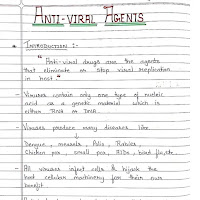Antiviral Agents (Unit: 3)
Handwritten Notes on Antiviral Agents:
- Amantadine hydrochloride
- Rimantadine hydrochloride
- Idoxuridine trifluoride
- Acyclovir*
- Gancyclovir
- Zidovudine
- Didanosine
- Zalcitabine
- Lamivudine
- Loviride
- Delavirdine
- Ribavirin
- Saquinavir
- Indinavir
- Ritonavir
Detail Explanation
Antiviral agents are drugs designed to treat viral infections by targeting various stages of the viral life cycle. These agents can inhibit viral entry, replication, or release, making them essential tools in combating viral diseases.
Amantadine hydrochloride and Rimantadine hydrochloride are effective against influenza A viruses by blocking the M2 ion channel, which is crucial for viral uncoating. Idoxuridine trifluoride is used for herpes simplex virus (HSV) infections by inhibiting viral DNA synthesis.
Acyclovir* and Gancyclovir are nucleoside analogs that target viral DNA polymerase, preventing DNA replication. Similarly, Zidovudine, Didanosine, Zalcitabine, and Lamivudine are reverse transcriptase inhibitors used in the treatment of HIV infections.
Non-nucleoside reverse transcriptase inhibitors, such as Loviride and Delavirdine, bind to a different site on reverse transcriptase, inhibiting its activity. Ribavirin, a broad-spectrum antiviral, inhibits RNA synthesis and is effective against various RNA viruses. Protease inhibitors like Saquinavir, Indinavir, and Ritonavir are used in HIV therapy to prevent the maturation of infectious viral particles.
These antiviral agents play a critical role in managing viral diseases, improving patient outcomes, and reducing the burden of infections worldwide.
Info!
If you are the copyright owner of this document and want to report it, please visit the copyright infringement notice page to submit a report.

